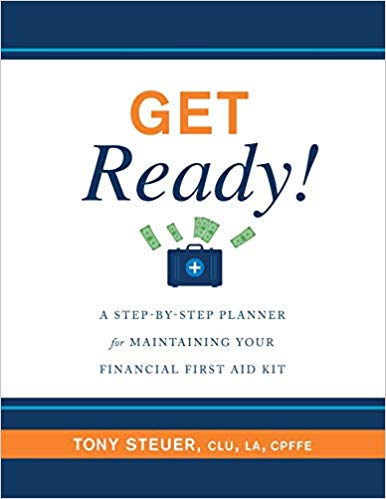Let’s talk money! While it might not be a favorite topic of conversation, it’s certainly an important one, especially when kiddos come into the mix. To get educated about all these finances, we’ve been reading GET READY! A Step-by-Step Planner for Maintaining Your Financial First-Aid Kit by Tony Steuer. As a recognized authority on financial literacy and author, read on to learn ways you can get your finances in order this year:
Below are Tony’s suggestions on the MOST important action item each month to keep your finances in shape:

January: Review your budget and cash flow as well as your net worth statement. This lets you see how you did last year and if you want to make any changes for the new year.
February: Organize tax documents and receipts.
If you’re feeling ambitious: Organize all financial documents from prior year to prep for taxes. It’s like spring cleaning for your finances.
March: Review your investments and allocations, making sure you are still on track for major goals such as retirement savings.
April: File federal and state income tax returns.
May: Order credit reports.
June: Review retirement plan contributions and projections to see if you are on target
July: Hold a family financial meeting. Review old goals and set new ones.
August: Review estate plan and estate planning documents to make sure they are current. This includes wills, trusts, and advance directives.
September: Review insurance policies to prep for November by making sure coverage still meets your needs and preparing to adjust accordingly.
October: Review your financial first aid kit
November: Open enrollment for group employee benefits and Individual Health Insurance begins.
December: Wrap up any loose ends from your financial year.
It’s also important to cut down on the clutter, but what documents, exactly, are non-essential, what’s a short-term keep, and what’s a long-term document? Below are just a few recommendations from Tony’s list of common papers:
Bank account records: Keep statements & canceled checks for 6 years (receipts until statement reconciliation)
Car (title, registration, repair records): Until 6 months after sale
Home purchase documents: Keep on had for at least 6 years after sale of home
Pay stubs: Keep for 6 years
Credit card statements and documents: If used for tax purposes, keep for 6 years; otherwise shred statements & receipts after reconciling statement, or longer if you wish to return something
Student loan records: Keep indefinitely as proof of payoff
Rental agreements: Retain for up to 6 years after agreement is terminated
Health insurance policy and documents: Until coverage ends or is canceled

